英语be supposed to 的用法
关于英语be supposed to 的用法
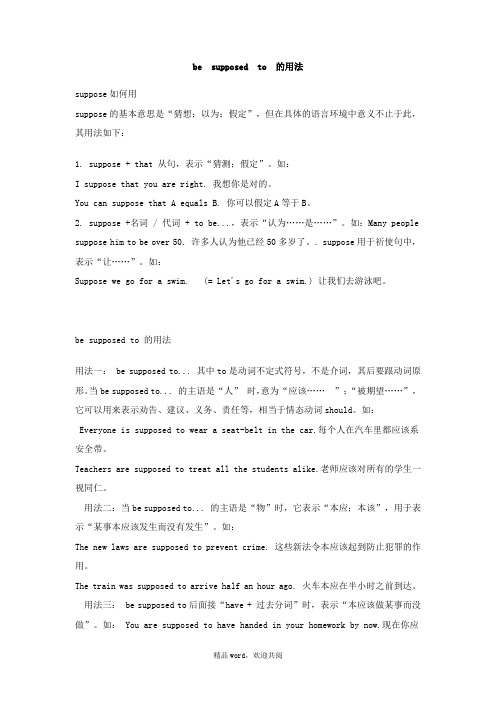
be supposed to 的用法suppose如何用suppose的基本意思是“猜想;以为;假定”,但在具体的语言环境中意义不止于此,其用法如下:1. suppose + that 从句,表示“猜测;假定”。
如:I suppose that you are right. 我想你是对的。
You can suppose that A equals B. 你可以假定A等于B。
2. suppose +名词 / 代词 + to be...,表示“认为……是……”。
如:Many people suppose him to be over 50. 许多人认为他已经50多岁了。
. suppose用于祈使句中,表示“让……”。
如:Suppose we go for a swim. (= Let's go for a swim.) 让我们去游泳吧。
be supposed to 的用法用法一: be supposed to... 其中to是动词不定式符号,不是介词,其后要跟动词原形。
当be supposed to... 的主语是“人” 时,意为“应该……”;“被期望……”,它可以用来表示劝告、建议、义务、责任等,相当于情态动词should。
如:Everyone is supposed to wear a seat-belt in the car.每个人在汽车里都应该系安全带。
Teachers are supposed to treat all the students alike.老师应该对所有的学生一视同仁。
用法二:当be supposed to... 的主语是“物”时,它表示“本应;本该”,用于表示“某事本应该发生而没有发生”。
如:The new laws are supposed to prevent crime. 这些新法令本应该起到防止犯罪的作用。
The train was supposed to arrive half an hour ago. 火车本应在半小时之前到达。
be supposed to的用法

be supposed to 的用法be supposed to 的用法用法一:be supposed to... 其中to是动词不定式符号,不是介词,其后要跟动词原形。
当be supposed to... 的主语是“人” 时,意为“应该……”;“被期望……”,它可以用来表示劝告、建议、义务、责任等,相当于情态动词should。
如:Everyone is supposed to wear a seat-belt in the car.每个人在汽车里都应该系安全带。
Teachers are supposed to treat all the students alike.老师应该对所有的学生一视同仁。
用法二:当be supposed to... 的主语是“物”时,它表示“本应;本该”,用于表示“某事本应该发生而没有发生”。
如:The new laws are supposed to prevent crime. 这些新法令本应该起到防止犯罪的作用。
The train was supposed to arrive half an hour ago. 火车本应在半小时之前到达。
用法三:be supposed to后面接“have + 过去分词”时,表示“本应该做某事而没做”。
如: You are supposed to have handed in your homework by now.现在你应该已经把作业交上来了。
He is supposed to have arrived an hour ago. 他应该一小时前就到了。
用法四:be supposed to... 的否定结构为be not supposedto...,它常用于口语中,意为“不被许可;不应当”。
如:She was not supposed to be angry about that. 她本不该为那件事而生气的。
You are not supposed to smoke on the bus. 你不应该在公共汽车上吸烟。
单元语法聚焦十

单元语法聚焦十be supposed to do, be expected to do以及“It is+adj. +to do”的用法1. be supposed to do的用法(1)be supposed to do意为“应该做……,被期望做……”,用来表示劝说、建议、义务、责任等,相当于情态动词should。
We are supposed to regard our parents as friends. 我们应该把父母当作朋友。
(2)be supposed to do还能够表示“本应该做某事而没做某事”。
You were supposed to be here an hour ago!你本该一小时往常就到这儿!2. be expected to do的用法be expected to do意为“被期待做……”。
You're expected to help them.他们期待你关心他们。
[常用搭配](1)expect sth 期待某事/某物He's expecting his son's good news.他正在期待亲小孩的好消息。
(2)expect to do sth期待做某事I expect to meet you again.我期待再次遇到你。
(3)expect sb to do sth 期待某人做某事They expected me to join them.他们期待我加入他们。
3. “It is+adj. +to do”的用法在此句型中,it作形式主语,不定式作真正的主语。
“It's+adj. +for/ of sb to do sth”意为“关于某人来说,做某事是……的”。
当形容词为表示人的品质类的形容词(如kind, nice, clever, wise, foolish等)时,常用介词of;当形容词为表示事物的特点类的形容词(如important, easy, hard, diffic ult, necessary等)时,常用介词for。
人教版九年级英语 第十单元语法 - be supposed to 的用法

三. 表示“应该”的其他方式:
1. should 【aux. 】应该 ☞ We should get together to discuss this. 我们可以一起来讨论这事。
2. ought to 【aux.v. 】应该 ☞ I think we ought to give him a chance. 我想我们应该给他一个机会。
writing skills.
A. keep
B. kept
C. keeping
D. to keep
练习:一. 单选
4.-- A are you supposed to do when you meet them for the first time?
--we are supposed to shake hands with them.
4. Later I found out French people are supposed to kiss
句
when they see each other.
后来我发现法国人见面时应该亲吻对方。
一. be supposed to do sth.
解析
1. 应该…;被期望….. 表示根据规定或传统习惯,人们不得不做某事或期待发生某事, 用于劝告/建议/义务/责任等,相当于should/ought to ☞ 如果你要离开教室的话,应该先问问老师。 You are supposed to ask teacher if you want to leave the classroom.
2. sth. be supposed to… 本应,本该;(本应该发生,但没发生,) ☞ 这次会议本应该在星期二举行,但是我们不得不把它推迟了。 The meeting is supposed to take place on Tuesday, but we have to put it on.
be supposed to用法详解
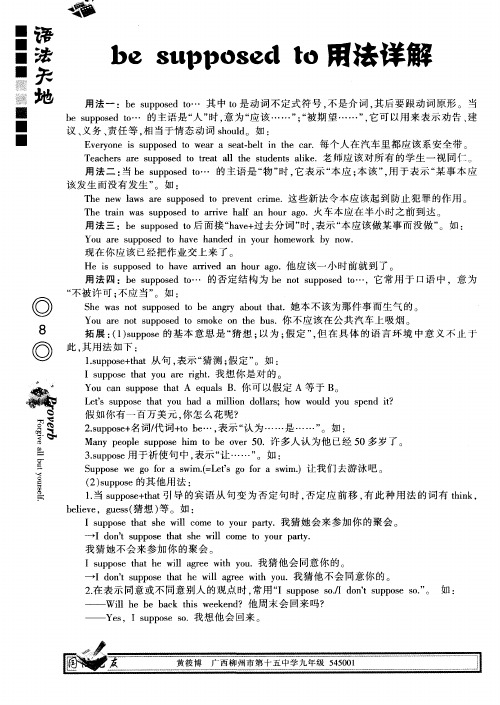
● ■ ● 一 0 ≯ 隧 ■ 一
◎ 8◎ b e s u p p o s e d t o用法详解 浯 法 地
用 法一 :b e s u p p o s e d t o … 其 中t o是动 词不 定式 符 号 , 不 是介 词 , 其 后要 跟 动词 原形 。 当 b e s u p p o s e d t o … 的主语 是 “ 人” 时, 意为“ 应 该 … …” ; “ 被 期望 … …” , 它 可 以用来 表示 劝告 、 建 议、 义务、 责 任等 , 相 当于情态 动词 s h o u l d 。如 : E v e r y o n e i s s u p p o s e d t o w e a r a s e a t . b e l t i n t h e c a r .每个 人在 汽车里 都应该 系安 全带 。 T e a c h e r s a r e s u p p o s e d t o t r e a t a l 1 t h e s t u d e n t s a l i k e .老 师应 该对 所有 的学 生一 视 同f _ _ _ = 。 用法二 : 当b e s u p p o s e d t o … 的主语 是 “ 物” 时, 它表 示 “ 本应 ; 本该” , 用 于表 示 “ 某 事本 应 该 发 生而没 有发 生” 。如 : T h e n e w l a w s a r e s u p p o s e d t o p r e v e n t c r i m e .这些 新法 令本应 该起 到 防止犯罪 的作用 。 T h e t r a i n w a s s u p p o s e d t o a r r i v e h a l f a n h o u r a g o .火车本 应在 半小 时之前 到达 。 用 法 三 :b e s u p p o s e d t o 后 面接 “ h a v e + 过去分 词 ” 时, 表示 “ 本应 该做 某事 而没做 ” 。如 :
be supposed to的用法
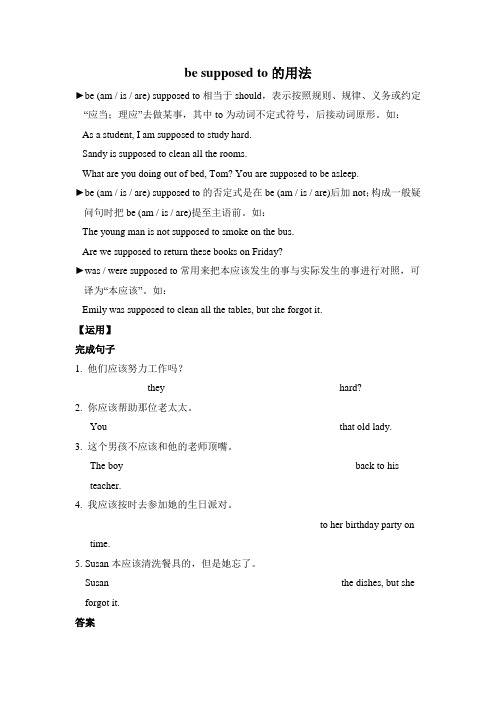
be supposed to的用法►be (am / is / are) supposed to相当于should,表示按照规则、规律、义务或约定“应当;理应”去做某事,其中to为动词不定式符号,后接动词原形。
如:As a student, I am supposed to study hard.Sandy is supposed to clean all the rooms.What are you doing out of bed, Tom? You are supposed to be asleep.►be (am / is / are) supposed to的否定式是在be (am / is / are)后加not;构成一般疑问句时把be (am / is / are)提至主语前。
如:The young man is not supposed to smoke on the bus.Are we supposed to return these books on Friday?►was / were supposed to常用来把本应该发生的事与实际发生的事进行对照,可译为“本应该”。
如:Emily was supposed to clean all the tables, but she forgot it.【运用】完成句子1. 他们应该努力工作吗?___________ they ___________ ___________ ___________ hard?2. 你应该帮助那位老太太。
You ___________ ___________ ___________ ___________ that old lady.3. 这个男孩不应该和他的老师顶嘴。
The boy ___________ ___________ ___________ ___________ back to histeacher.4. 我应该按时去参加她的生日派对。
be supposed to do 句式的用法
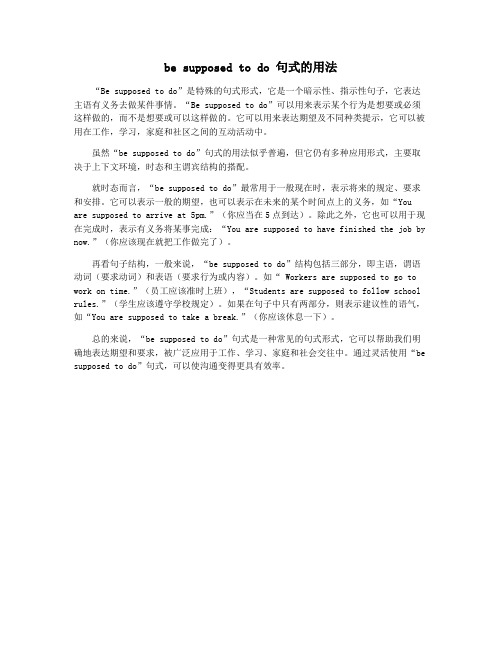
be supposed to do 句式的用法“Be supposed to do”是特殊的句式形式,它是一个暗示性、指示性句子,它表达主语有义务去做某件事情。
“Be supposed to do”可以用来表示某个行为是想要或必须这样做的,而不是想要或可以这样做的。
它可以用来表达期望及不同种类提示,它可以被用在工作,学习,家庭和社区之间的互动活动中。
虽然“be supposed to do”句式的用法似乎普遍,但它仍有多种应用形式,主要取决于上下文环境,时态和主谓宾结构的搭配。
就时态而言,“be supposed to do”最常用于一般现在时,表示将来的规定、要求和安排。
它可以表示一般的期望,也可以表示在未来的某个时间点上的义务,如“You are supposed to arrive at 5pm.”(你应当在5点到达)。
除此之外,它也可以用于现在完成时,表示有义务将某事完成:“You are supposed to have finished the job by now.”(你应该现在就把工作做完了)。
再看句子结构,一般来说,“be supposed to do”结构包括三部分,即主语,谓语动词(要求动词)和表语(要求行为或内容)。
如“ Workers are supposed to go to work on time.”(员工应该准时上班),“Students are supposed to follow school rules.”(学生应该遵守学校规定)。
如果在句子中只有两部分,则表示建议性的语气,如“You are supposed to take a break.”(你应该休息一下)。
总的来说,“be supposed to do”句式是一种常见的句式形式,它可以帮助我们明确地表达期望和要求,被广泛应用于工作、学习、家庭和社会交往中。
通过灵活使用“be supposed to do”句式,可以使沟通变得更具有效率。
besupposedto的用法-学易试题君之每日一题君2019学年上学期九年级英语人教版
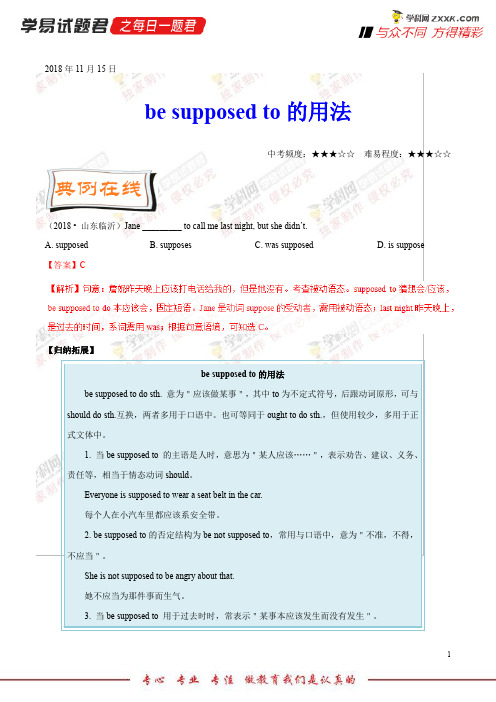
1 2018年11月15日
be supposed to 的用法
中考频度:★★★☆☆ 难易程度:★★★☆☆
(2018 • 山东临沂)Jane _________ to call me last night, but she didn’t.
A. supposed
B. supposes
C. was supposed
D. is suppose
【答案】
C
【归纳拓展】 be supposed to 的用法
be supposed to do sth. 意为"应该做某事",其中to 为不定式符号,后跟动词原形,可与should do sth.互换,两者多用于口语中。
也可等同于ought to do sth.,但使用较少,多用于正式文体中。
1. 当be supposed to 的主语是人时,意思为"某人应该……",表示劝告、建议、义务、责任等,相当于情态动词should 。
Everyone is supposed to wear a seat belt in the car.
每个人在小汽车里都应该系安全带。
2. be supposed to 的否定结构为be not supposed to ,常用与口语中,意为"不准,不得,不应当"。
She is not supposed to be angry about that.
她不应当为那件事而生气。
3. 当be supposed to 用于过去时时,常表示"某事本应该发生而没有发生"。
中考英语 知识点精讲十 4 be supposed to课件
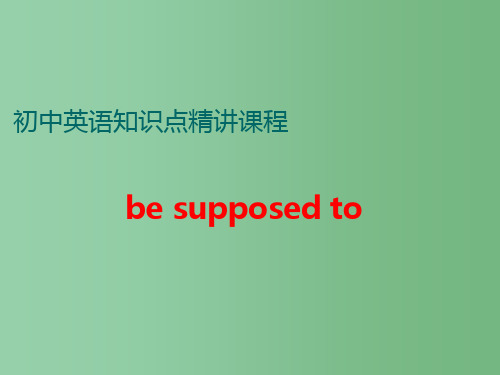
B. following D. to following
即学即练
2. She was supposed ____D____ the table, but she didn’t.
A. to cleaning B. clean C. cleaning D. to have cleaned
课堂小结
一. be supposed to 的用法 1. 主语为人, 表示“应该;被期望” 2. 主语为物,表示“本应;本该” 3. be supposed to + have done“本应该完成某事却没有” 4. 否定结构: be not supposed to“不被许可,不应当” 二. be supposed to 与 be expected to 的区别
e.g. The train was supposed to arrive ten minutes ago.
ቤተ መጻሕፍቲ ባይዱ 知识讲解
3. be supposed to + have done“本应该完成某事却没有” e.g. Tom, you are supposed to have cleaned your room.
知识讲解
一. be supposed to 的用法 1. 主语为人, + V原形,意为“应该;被期望”(劝告、 建议、义务、责任等)。
e.g. I am supposed to start work at 7:30 every morning. 2. 主语为物, + V原形,意为“本应;本该”(某事本该发生 却没发生)。
4. 否定结构: be not supposed to“不被许可,不应当” e.g. You are not supposed to go when the light is red.
人教版 九级英语第十单元 U-10 语法 - be supposed to

一. be supposed to do sth.
3. 否定结构: be not supposed to…不应该做某事 ①. You are not supposed to smoke on the bus. 你不应该在公共汽车上吸烟。 ②. You are not supposed to do that. 你不应做那件事。
3 . expect to do sth. 期待做某事 ☞ We expect to meet you again. 我们期待再次见到你。
4. expect sb. to do sth. 期待某人做某事 ☞ They expected Mary to join them. 他们期待玛丽加入他们。
三. 辨析:be supposed to 和 be expected to
二. expected vt. 预料; 预期
1. be expected to do sth. 被期待做事;应该做某事 ☞ You are expected to help him. 你应该帮助他。
2. expect sth. 期待某事/某物 ☞ She’s expecting her daughter’s good news. 她正在其他女儿的好消息。
4. Later I found out French people are supposed to kiss when they see each other. 后来我发现法国人见面时应该亲吻对方。
一. be supposed to do sth.
1. sb. be supposed to do sth. 应该…;被期望….. 根据规定或传统习惯,不得不做某事; 期待发生某事, 用于劝告/建议/义务/责任等,相当于should/ought to
be supposed to

be supposed to的用法
本单元学习短语be supposed to,它的意思是“应该做某事、被期望做某
事”。
关于这个短语的基本用法,我们需要从以下几个方面来掌握。
一、当句子的主语是人时短语be supposed to用在句子中,句子的主语是人的时候,它表示“应该做某事、被期望做某事”的意思,短语经常用来表示劝告、建议、义务和责任等。
例如:
You are supposed to ask our teacher if you want to leave the classroom.
如果你要离开教室,应该先问一问我们的老师。
短语be supposed to相当于情态动词should。
二、当句子的主语是物时短语be supposed to用在句子中,句子的主语是物的时候,它表示“本该、本应”的意思,短语经常用来表示某事物本应该发生而没有发生。
例如:
The meeting was supposed to take place on Tuesday, but we have to put it off.
这个会议本应该在星期二举行,但我们不得不把他推迟了。
三、短语be supposed to的否定形式在否定句中用be not supposed to do something表示“不应该做某事”,表示命令和禁止。
例如:
You are not supposed to talk loudly in class.
你不应该在课堂上大声交谈。
You are not supposed to smoke on the bus.
你不应该在公共汽车上吸烟。
be supposed to do的翻译

be supposed to do的翻译
be supposed to do
英[bi səˈpəʊzd tu duː] 美[bi səˈpoʊzd tu duː]
应该做某事;本应(本该)做某事(表示某事本应发生而没有发生);被相信(被认为)做某事
双语例句
1.Will the au pair be supposed to do light housework?
互惠生需要会做轻体力的家务活吗?
2.be supposed to do/ be sth You were supposed to be here an hour ago!
(按规定、习惯、安排等)应当,应,该,须:你本该在一小时以前就到这儿!
3.I must write down each hour to be supposed to do any, perhaps I incompletely illuminate do, but must subscribe this plan.
我要写下每个小时该干什么,也许我不完全照做,但还是要订下这个计划。
4.The happiness which this reply produced, was such as he had probably never felt before; and he expressed himself on the occasion as sensibly and as warmly as a man violently in love can be supposed to do.
这个回答简直使他感到从来没有过的快乐,他正象一个狂恋热爱的人一样,立刻抓住这个机会,无限乖巧、无限热烈地向她倾诉衷曲。
Unit 10 You’re supposed to shake hands语法小专题配套练习题

Unit 10 You're supposed to shake hands单元语法小专题(Grammar Focus)语法精讲be supposed to的用法1.be supposed to意为“应该、理应、被期望”,多用来表示劝告、建议、义务、责任等,相当于should。
be supposed to的时态、人称和数等的变化都在be动词上体现,其中的to是动词不定式符号,后面接动词原形。
如:Parents are supposed to ask their children to know some good manners.父母应该让孩子们知道一些好的礼仪。
You're supposed to start work at 8:30 every morning.你应该每天早晨8点半开始工作。
2.be supposed to的否定形式是be not supposed to,相当于should not或be not allowed to,意为“不应该,不准、不得”。
如:We are not supposed to play football in the street.我们不应该在街上踢足球。
3.be supposed to的一般疑问句是将be的相应形式置于主语前,特殊疑问句是在一般疑问句前加上相应的疑问词。
如:Is she supposed to arrive at the train station at three o'clock in the afternoon? 她应该在下午三点钟到火车站吗?4.be supposed to have done sth.表示“本应该做某事但没做”。
如:He's supposed to have finished the work so far.到目前为止,他本应该完成这项工作。
You're supposed to have handed in your homework.你本该把作业交上来了。
语法 be supposed to do

2)
be not supposed to do
e.g. 你不准在这抽烟。 You are not supposed to smoke here。 你不应该在教室踢足球。 You are not supposed to play football in the classroom。
3)一般疑问句: be supposed to do的疑问句式须将be的 相应形式提到主语前。 e.g.他应该在5点钟到吗? Is he supposed to get there at five? 露西应该像那样说汉语吗? Was Lucy supposed to speak Chinese like that?
4. Students are ____to speak loudly in the reading room. A. told B. supposed C. not supposed D allowed ually people in Japan and Korea____ when they meet for the first time. A. are supposed to kiss B. are supposed to bow C. suppose to kiss D. suppose to how
6. People are ______ to ______ when they meet for the first time. A. suppose; shake hands B. supposed; shake hands C. supposed; shake hand D. suppose; shake hand 7. I don’t supposed anyone can work out the problem,________? A. do I B. don’t I C. can they D. can’t they 8. You _____ supposed to take them out of the room. A. didn’t B. aren’t C. don’t D. can’t
2021年秋人教版九年级英语第十单元语法知识(be supposed to do)

2021年秋人教版九年级英语第十单元语法知识(be supposed to do)----c5fd5176-6ea2-11ec-b8e2-7cb59b590d7d2021年秋人教版九年级英语第十单元语法知识(besupposedtodo)第十单元语法知识的使用besupposedtodosth=shoulddosth=beexpectedtodosth(译为“应该做某事”)人称,时态和句式的变化在be动词上体现被期望做某事eg:iamsupposedtolookaftermysister.heissupposedtoworkhard.theyaresupposedtoslee patnine.2.否定句:eg:iamnotsupposedtolookaftermysister.heisn’tsupposedtoworkhard.theyaren’tsup posedtosleepatnine.3.一般问题:eg:areyousupposedtolookafteryoursister?ishesupposedtoworkhard?aretheysupposedt osleepatnine?4.特别问题:eg:whatareyousupposedtodo?whatishesupposedtodo?whataretheysupposedtodo?是的,我是。
不,我不是。
是的,你好。
不,他不是。
是的,他们是。
不,他们没有1)besupposedtodosth:当主语是人时,译为“应该做某事”,可以用来表示劝告、建议、义务、责任等你没有被要求在教室里付足球费。
2)当besupposedtodosth的主语是物时,表示“本应该做某事”,用来表示“某事本应该发生而没有发生”火车被认为是在阿尔法罕河上。
(火车应该在半小时前到达,但没有到达)3)besupposedto+have+过去分词:主语为人时,译为“本应该做某事而没有做”,含有责备,失望之意他已经到达了胡拉戈。
秋人教版九年级英语第十单元语法知识(be supposed to do)

第十单元语法知识be supposed to do sth 的用法:be supposed to do sth = should do sth = be expected to do sth (译为“应该做某事”)人称,时态和句式的变化在be动词上体现(注意:be expected to do sth还可以表示为“被期待做某事”,根据句意翻译)1、肯定句:eg: I am supposed to look after my sister.He is supposed to work hard.They are supposed to sleep at nine.2、否定句:eg: I am not supposed to look after my sister.He isn’t supposed to work hard.They aren’t supposed to sleep at nine.3、一般疑问句:eg: Are you supposed to look after your sister? Yes, I am. No, I am not.Is he supposed to work hard? Yes, he is. No, he isn’t.Are they supposed to sleep at nine? Yes, they are. No, they aren’t.4、特殊疑问句:eg: What are you supposed to do?What is he supposed to do?What are they supposed to do ?用法:1)be supposed to do sth: 当主语是人时,译为“应该做某事”,可以用来表示劝告、建议、义务、责任等eg: You aren’t supposed to play football in the classroom.2) 当be supposed to do sth 的主语是物时,表示“本应该做某事”,用来表示“某事本应该发生而没有发生”eg: The train was supposed to arrive half an hour ago.(火车本该在半小时前到,但是没到)3) be supposed to +have+过去分词:主语为人时,译为“本应该做某事而没有做”,含有责备,失望之意eg: He is supposed to have arrived an hour ago.(他本应该一小时前就到了,含有责备之意)1. People in China are supposed to shake hands when they meet their friends. (提问)__________ _________ people in China _________ __________ _________ when they meet their friends?1.She is supposed to arrive at 7a.m. (一般疑问句)_____________ she _____________ ____________ arrive at 7a.m.?2.你不应该在这里打电话。
九年级英语Unit10-You're-supposed-to-shake-hands.课文重难点知识点详细讲解
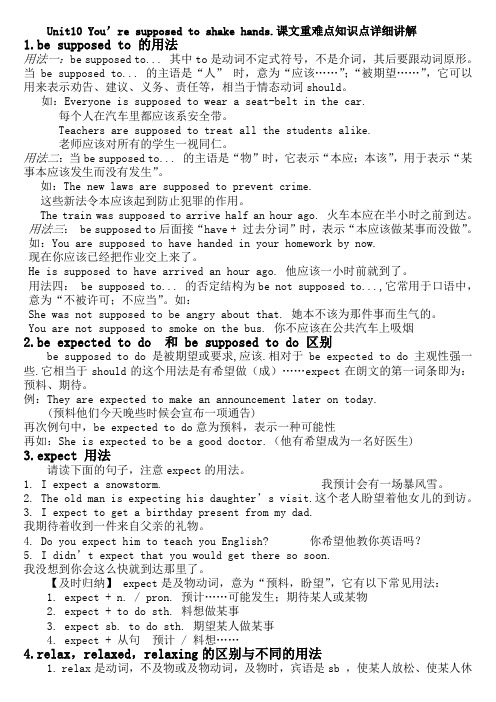
Unit10 You’re supposed to shake hands.课文重难点知识点详细讲解1.be supposed to 的用法用法一:be supposed to... 其中to是动词不定式符号,不是介词,其后要跟动词原形。
当be supposed to... 的主语是“人”时,意为“应该……”;“被期望……”,它可以用来表示劝告、建议、义务、责任等,相当于情态动词should。
如:Everyone is supposed to wear a seat-belt in the car.每个人在汽车里都应该系安全带。
Teachers are supposed to treat all the students alike.老师应该对所有的学生一视同仁。
用法二:当be supposed to... 的主语是“物”时,它表示“本应;本该”,用于表示“某事本应该发生而没有发生”。
如:The new laws are supposed to prevent crime.这些新法令本应该起到防止犯罪的作用。
The train was supposed to arrive half an hour ago. 火车本应在半小时之前到达。
用法三: be supposed to后面接“have + 过去分词”时,表示“本应该做某事而没做”。
如:You are supposed to have handed in your homework by now.现在你应该已经把作业交上来了。
He is supposed to have arrived an hour ago. 他应该一小时前就到了。
用法四: be supposed to... 的否定结构为be not supposed to...,它常用于口语中,意为“不被许可;不应当”。
如:She was not supposed to be angry about that. 她本不该为那件事而生气的。
be supposed to 的用法

● 用法 (1)当be supposed to 主语是人的时候,意为“应该(做)......”,可以用 来表示劝告、建议、义务、责任等。 >> You are supposed to do your homework first when you get home. >> You are not supposed to point to others with chopsticks. (2)当be supposed to 的主语是事物的时候,表示“某事本该发生而没有 发生”。 >> The train was supposed to arrive 15 mininutes ago. (3)be supposed to + have +表达方式,含有责备失望之意。 >> You are supposed to have arrived here half an hour ago.
be supposed to
总结 概念:应该做某事:
肯定句式:be supposed to do 句式: 否定句式:be not suppsed to do
疑问句式:将be 动词提到主语的前面 用法:
be supposed to
用法
主语是人:应该(做)某事 主语是物: 某事本该发生却没有发生
be supposed to 本应该做某事却没做, +have +动词过去分词 : 含有责备,失望之意。
be supposed to
●概述 ●句式 ●用法
● 概述 be supposed to do sth. “应该做某事”, 相当于should do sth. 或 be expected to do sth. >> You are supposed to buy a ticket in advance. 你应该提前买票
- 1、下载文档前请自行甄别文档内容的完整性,平台不提供额外的编辑、内容补充、找答案等附加服务。
- 2、"仅部分预览"的文档,不可在线预览部分如存在完整性等问题,可反馈申请退款(可完整预览的文档不适用该条件!)。
- 3、如文档侵犯您的权益,请联系客服反馈,我们会尽快为您处理(人工客服工作时间:9:00-18:30)。
be supposed to 的用法suppose如何用suppose的基本意思是“猜想;以为;假定”,但在具体的语言环境中意义不止于此,其用法如下:1. suppose + that 从句,表示“猜测;假定”。
如:I suppose that you are right. 我想你是对的。
You can suppose that A equals B. 你可以假定A等于B。
2. suppose +名词 / 代词 + to be...,表示“认为……是……”。
如:Many people suppose him to be over 50. 许多人认为他已经50多岁了。
. suppose用于祈使句中,表示“让……”。
如:Suppose we go for a swim. (= Let's go for a swim.) 让我们去游泳吧。
be supposed to 的用法用法一: be supposed to... 其中to是动词不定式符号,不是介词,其后要跟动词原形。
当be supposed to... 的主语是“人”时,意为“应该……”;“被期望……”,它可以用来表示劝告、建议、义务、责任等,相当于情态动词should。
如:Everyone is supposed to wear a seat-belt in the car.每个人在汽车里都应该系安全带。
Teachers are supposed to treat all the students alike.老师应该对所有的学生一视同仁。
用法二:当be supposed to... 的主语是“物”时,它表示“本应;本该”,用于表示“某事本应该发生而没有发生”。
如:The new laws are supposed to prevent crime. 这些新法令本应该起到防止犯罪的作用。
The train was supposed to arrive half an hour ago. 火车本应在半小时之前到达。
用法三: be supposed to后面接“have + 过去分词”时,表示“本应该做某事而没做”。
如: You are supposed to have handed in your homework by now.现在你应该已经把作业交上来了。
He is supposed to have arrived an hour ago. 他应该一小时前就到了。
用法四: be supposed to... 的否定结构为be not supposedto...,它常用于口语中,意为“不被许可;不应当”。
如:She was not supposed to be angry about that. 她本不该为那件事而生气的。
You are not supposed to smoke on the bus. 你不应该在公共汽车上吸烟。
suppose的其他用法:1.suppose + that 引导的宾语从句“假设,猜想,以为”。
例如:Let's suppose that you had a million dollars, how would you spend it?假如你有一百万美元,你怎么花呢?I suppose that she'll be there today.我想她今天能到那里。
I had supposed he had died years ago.我原以为他几年前就去世了。
2.当suppose + that 引导的宾从变为否定句时,否定应前移,有此种用法的词有think, believe, guess(猜想)等。
例如:I suppose that she will come to your party.→ I don't suppose that she will come to your party.我猜她不会来参加你的晚会。
I suppose that he will agree with you.→ I suppose that he will agree with you.3.在表示同意或不同意别人的观点时,常用“I suppose so/ I don't suppose so”。
--- Will he be back this weekend?他周末会回来吗?--- Yes, I suppose so.我想他会回来。
Wish和hope的区别wish和hope都表示“想”“希望”,宾语可为to +动词原型,不可是动词的ing形式。
I hope (wish) to visit Guilin .不同点:(1)wish +宾+ to +动词原形表示命令,hope无此用法I wish you to go意思是我要你去(2)hope后不能直接跟名词作宾语,可跟for +名词,表示可实现的“希望”,wish 虽也跟for +名词,但表示难实现的“愿望”。
I hope for success .我希望成功。
I wish for a car .我很想得到小汽车(3)hope和wish可跟that从句,但hope + that表示希望wish + that表示“愿望”,且从句动词用虚拟语气I hope you”ll be better soon .I wish I were ten years younger .(4)wish可跟双宾语We wish you a happy New Year从语义上说,desire表示“热切的希望,强烈的愿望”,语气比较强。
从语体上说,desire 主要用于正式语体,在口语中较少使用。
hope主要用于可能实现的事情,既可用于正式语体,又可用于非正式语体。
从语法上说,及物动词desire可接名词、动词不定式、从句或宾语+ to do复合结构,而及物动词hope不能接名词或复合结构,只能接动词不定式和从句。
When和while的区别while和when都是表示同时,到底句子中是用when还是while主要看从句和主句中所使用的动词是短暂性动作(瞬时动词)还是持续性动作。
1、若主句表示的是一个短暂性的动作,而从句表示的是一个持续性动作时,两者都可用。
如:He fell asleep when [while] he was reading. 他看书时睡着了。
I met him when [while] I was taking a walk in the park. 我在公园散步时遇到了他。
2、若主、从句表示两个同时进行的持续性动作,且强调主句表示的动作延续到从句所指的整个时间,通常要用 while。
如:Don’t talk while you’re eating. 吃饭时不要说话。
I kept silent while he was writing. 在他写的时候,我默不作声。
3、若从句是一个短暂性动作,而主句是一个持续性动作,可以 when 但不用 while。
如:When he came in, I was listening to the radio. 他进来时,我在听收音机。
It was raining hard when we arrived. 我们到达时正下着大雨。
4、若主、从句表示的是两个同时(或几乎同时)发生的短暂性动作,一般要用 when。
如:I thought of it just when you opened your mouth. 就在你要说的时候,我也想到了。
至于什么是短暂性动作,什么是持续性动作,其实有个很简单的规律。
就是如果是进行时态,一般是持续性的。
如果是过去式,一般是短暂性动作。
对于,填写when还是while的问题,通常首先看主句和从句中的时态,再根据以上4个规律来判断填写那个单词。
put away v.放好, 储存...备用, 处理掉, 放弃, 抛弃put on v.穿上, 把...放在上, 装出, 假装, 增加, 欺骗, 添上, 使靠...维持生命put up v.举起, 抬起, 进行, 提供, 表现出, 建造, 提名, 推举put off v.推迟, 拖延, 搪塞, 使分心, 使厌恶, 扔掉, 脱掉, 劝阻put into v.使进入, 把...翻译成, 在...上种植put down v.放下, 拒绝, 镇压, 羞辱, 削减, 记下, 制止, 取缔put out v.放出, 伸出, 生产, 消除, 打扰, 麻烦, 作出努力, 使退场put in 插话,put on 穿上,put down 记下来,写下来,put sth aside 放到一边,put it on 假装生气,put away 收起来,put sth by 存钱以备不时之需,put back,放回,put off 推迟,放下。
一、So do I的用法该结构主要用来说明前面所说的情况也同样适用于后面的人或物,[意为“……也一样”]。
该结构中的助动词 do 根据前文的情况也可换成 is, am, are, was, were, does, did, can, could 等。
如:He passed the exam, and so did I.=He passed the exam, and I passed the exam, too.=Both he and I passed the exam.=He and I both passed the exam.他通过了考试,我也通过了考试。
/ 他和我都通过了考试。
又如:They went to the zoo yesterday. So did we. 他们昨天去了动物园,我们也去了。
但是如果前面所述情况为否定式,则用neither, nor引出倒装句(此时不能用so)。
如:He couldn’t do it, and neither could she. 他做不了这事,她也做不了。
He never comes late. Nor do I. 他从不迟到,我也从不迟到。
二、So I do的用法该结构主要用于加强语气,其意为[“的确如此、确实如此”],表示后者赞同前者的话或意见,只是进一步强调并重复前句所述的内容。
前后句的主语指的是同一个人或物。
该结构中的助动词 do 根据前文的情况也可换成 is, am, are, was, were, does, did, can, could 等。
如:—He has done a good job. 他干得不错。
—So he has. 他的确干得不错。
by the way 顺便说一下in a way 在某种程度上on the way home 在回家的路上across the way 路对面, 街对面over the way 路对面, 街对面a long way off 在远处, 离得远all the way 一路上, 沿路从远处, 特地自始至终all the other way [口]相反的, 颠倒过来quite the other way [口]相反的, 颠倒过来very much the other way [口]相反的, 颠倒过来all the way from... to [美]在...和...之间be fond of one's own way 自己要怎样干就怎样干; 喜欢自行其是, 独断独行be in sb. 's way 妨碍某人, 阻挠某人stand in sb. 's way 妨碍某人, 阻挠某人be set in one's ways 死心眼, 脾气固执beat one's way [美俚]无票乘车, 偷搭火车blaze the way 开辟道路bluff one's way out (of) 蒙混过关bring up the hard way [口]严格地教育培养by the way 顺路; 在途中顺便说, 附带说说by way of 经由, 经过当作, 作为; 作出...样子clear the way for sth. 为...铺平道路, 为...准备条件pave the way for sth. 为...铺平道路, 为...准备条件smooth the way for sth. 为...铺平道路, 为...准备条件come in sb.'s way 走到某人跟前; 被某人碰到落到某人手里, 可以被某人利用为某人所经历; 为某人所擅长fall in sb.'s way 走到某人跟前; 被某人碰到落到某人手里, 可以被某人利用为某人所经历; 为某人所擅长lie in sb.'s way 走到某人跟前; 被某人碰到落到某人手里, 可以被某人利用为某人所经历; 为某人所擅长cut both ways 模棱两可; 互有利弊discover the hard way 经历一番艰苦才学到、理解...find out the hard way 经历一番艰苦才学到、理解...edge one's way 挤过去elbow one's way 挤着向前走face both ways 脚踏两只船; 采取两面态度fall by the way 中途掉队; 中途放弃、退出feel one's way 谨慎小心地进行prope one's way 谨慎小心地进行find one's way out of 设法走出, 摆脱fight one's way 奋斗前进, 打开一条道路fight one's way back (to) (艰苦奋战)打回(原处)find one's way to 设法赶到[进入] find the way to 设法赶到[进入]find one's way into 设法赶到[进入] find the way into 设法赶到[进入] force one's way 挤(出去), 冲(出去) push one's way 挤(出去), 冲(出去) shoulder one's way 挤(出去), 冲(出去)squeeze one's way 挤(出去), 冲(出去) thread one's way 挤(出去), 冲(出去) work one's way 挤(出去), 冲(出去) force out 挤(出去), 冲(出去)push out 挤(出去), 冲(出去) shoulder out 挤(出去), 冲(出去)squeeze out 挤(出去), 冲(出去) thread out 挤(出去), 冲(出去)work out 挤(出去), 冲(出去)follow one's way (=get one's way) 随心所欲地做; 独行其是follow one's way (=have one's way) 随心所欲地做; 独行其是gather way 增加速度; [喻]加强力量get in the way 妨碍get out of the way 让开; 避开解决(某事), 除去(某人), 摆脱put out of the way 让开; 避开解决(某事), 除去(某人), 摆脱get under way 出发; 开始前进give way (to) 让步; 退让让位于消失; 消除变弱, 衰退被某种感情征服, 失去控制 (健康等)垮掉, 恶化, 衰退 (头脑、神态)开始失常 (绳子、树枝)折断 (吓得、累得)发软, 支持不住 (股票)下跌go a good way (对...)非常有效, (对...)大有帮助足够, 充分; 可以维持很久可以购买很多东西(指钱) (人)有成就, 有前途go a great way (对...)非常有效, (对...)大有帮助足够, 充分; 可以维持很久可以购买很多东西(指钱) (人)有成就, 有前途go a long way (对...)非常有效, (对...)大有帮助足够, 充分; 可以维持很久可以购买很多东西(指钱) (人)有成就, 有前途go a good way with (对...)非常有效, (对...)大有帮助足够, 充分; 可以维持很久可以购买很多东西(指钱) (人)有成就, 有前途go a great way with (对...)非常有效, (对...)大有帮助足够, 充分; 可以维持很久可以购买很多东西(指钱) (人)有成就, 有前途go a long way with (对...)非常有效, (对...)大有帮助足够, 充分; 可以维持很久可以购买很多东西(指钱) (人)有成就, 有前途go all the way with sb. 完全同意某人意见; 给某人以全力支持go one's own way 一意孤行take one's own way 一意孤行go one's way(s) 动身, 前往go out of one's way (to do) 特意去(做), 想尽各种办法(做) go some way with 对...有点用处go the way of 走...的道路, 重蹈...的覆辙go the way of all flesh 死去, 逝世go the way of nature 死去, 逝世go the right way 采取正确[不正确]方法; 办得得法[不得法]go the wrong way 采取正确[不正确]方法; 办得得法[不得法]have a way of 有...习惯have a way of doing sth. 有...习惯have a way with (one) 善于接近(某种人) 有办法使人信服; 和蔼可亲, 有吸引人的风度have it both ways (辩论时)一时说东, 一时说西, 两面讨好两全其美have (everything) one's own way 为所欲为, 按照自己的意愿去做hold one's way (沿着一条路)一直前进, 不停止按照原样干下去, 继续干keep one's way (沿着一条路)一直前进, 不停止按照原样干下去, 继续干in a way 有几分, 稍微; 在某一方面; 在某种意义上; 在某种程度上in a bad way 病情严重; 精神不好; 受伤情况不好, 处境不好, 处于困境in a big way 大规模地; 豪华地; 隆重地in a great way 大规模地; 豪华地; 隆重地in a general way 一般说来, 大体上in a hundred and one ways 千方百计地in a round-about way 迂回曲折地; 转弯抹角, 兜圈子in a small way 少量地; 小规模地, 简朴地in a tin-pot way 蹩脚地, 不值钱地, 低劣地in an absent way 心不在焉地in an all-round way 全面地in any way 无论如何, 在任何情况下in every way 在各方面, 完全in no way 决不, 无论如何不in one's own way 自行其事, 随心所欲in oneway or another 想方设法in the way 挡住路, 妨碍, 多余的in the way of 至于说..., 在...方面in this way 这样, 以这种方式just the other way 恰恰相反keep out of the way 避开know one's way about 精通(业务, 技术), 熟悉(情况) 机敏老练, 能随机应变lead the way 带路look one way and row another [口]声东击西, 别有企图look the other way 掉过脸去不理睬人, 装作没看lose one's way 迷路, 迷失方向; 误入歧途miss one's way 迷路, 迷失方向; 误入歧途mend one's way 改变习惯; 改正错误; 改变作风no way [美口]无论如何不, 决不no two ways about it 必不可免, 别无办法毫无疑问, 不可能有两种想法或意见on one's way to 到...去的途中on the way 在途中once in a way 有时, 偶然one way or another 不管怎样, 设法, 以这样或那样的方式one way or other 不管怎样, 设法, 以这样或那样的方式one way or the other 不管怎样, 设法, 以这样或那样的方式out of the way 离大路很远的; 偏僻的, 远离人烟的在够不着的地方不妨碍人的, 不妨事的不同凡响的, 不寻常的错误的, 不成体统的pave the way for 为...铺平道路, 为...做好准备smooth the way for 为...铺平道路, 为...做好准备pay one's way 支付生活费勉强维持不负债能赚钱, 划得来小学二(2)班班规一、安全方面1、每天课间不能追逐打闹。
